Voting for Wisdom: Election 2016 & the GRA
A MiddleWeb Blog
I can’t truly say I am shocked about the results of this year’s Presidential Election. The scent of a possible Trump victory was strong a few weeks ago, when I was driving through rural, western New Jersey, up and down winding roads, surrounded by beautiful farmland and through small hamlets, en route to pick my son up after his weekend camp reunion.

I would be lying if I didn’t say this made me a bit nervous, but the beauty of the landscape kept my mind on the blue sky in front of me and the image of the smelly, 15-year old awaiting my arrival – the one who most likely hadn’t showered since I’d dropped him off three days before.
Thoughts of Donald and Hillary dissipated into the air as I arrived at camp and collected this other, very pungent scent, and loaded him (and his ripe baggage) into the car for the trip back home.
 Back to school and the election
Back to school and the election
A few short weeks later, back at school, the scent in our classroom was quite different, yet just as sharp. The political eau de toilette or, as it is more commonly referred to, Election 2016, had filled the hallways.
A Presidential Election has always been an exciting time at school. It allows us to use the present as a primary source for instruction. Using primary sources enables the kids to connect the past to the present, and when “the present” is a major event in the history of the United States, there is a unique opportunity for learning.
While I know the value of using primary sources as an instructional tool, the barbed and bitter commentary blowing around during the campaign was difficult to navigate. The acerbic aroma wafting across the airwaves and in print media made it difficult to model America’s goal of a civilized, respectful democratic system of government.
Connections between the election and Pax
Thankfully, as Election 2016 was coming to a close, so was our class read aloud by Sara Pennypacker, Pax. The rich wisdoms and deep messages within this beautiful story, chosen by Pernille Ripp as one of the 2016 Global Read Aloud books, helped us make some important connections to the politics of today.
My fourth graders are young, but they never cease to amaze me with their insights as readers, writers, and very small political analysts. Kids have a way of noticing the simple things. Their understanding of the universal themes and applicable wisdoms in Pax became much clearer as we elected a new President, began a nation-wide response to the President-elect, and simultaneously finished the novel.
Our discussions and the kids’ written responses to our class read-aloud started to reflect the plot of today’s United States history. Pax is a story of war and peace, and its message is strong:
Just because it isn’t happening here doesn’t mean it isn’t happening.”
Pennypacker begins her story with that simple quote. As the story unfolds, the scent of burned metal and charred lives helps illustrate that war affects many, that the wounds each individual person carries within himself need time to heal, and that vulnerability and lack of trust are difficult things to feel…and to overcome.
 Fourth graders intuiting the election’s impact
Fourth graders intuiting the election’s impact
My students are young in many ways. They live in a safe, upper-middle class hamlet of their own. They have a beautiful naiveté and innocence about the world. But at the same time, they see injustices around them, they hear the frustrated conversations of the adults in their lives, and they speculate about the future of America. They take note of the world around them, be it fictional or in the news.
They are only nine and ten, but on November 9th, a gust of excitement and political analysis blew into our room. We pulled up the 2016 Electoral College Map and shared our thoughts in an informal class discussion.
My goal had been to focus on our political process, not the candidates. I didn’t ask them to watch the election results for homework. Most of them watched anyway. As our morning discussion unfolded, the day after the results were in, it became quite clear that many of our learning objectives had been met…and we uncovered a few unintended wisdoms to ponder as well.
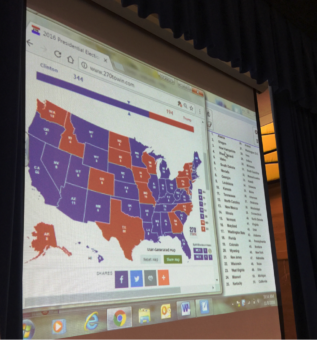
“When I first saw the results in Florida, I got confused. They broke it down into pieces of red and blue, just like they do with the states. It looked like Trump had it with all that red!”
“My parents kept asking me how many electoral votes each state had when all of the reporters kept saying it was ‘too close to call.’”
“Ohio has predicted the last thirteen or fourteen Presidents or something like that.”
We clicked around the Internet, revisited VotersEd to go back into election history, and explored some trends (starting with Alex’s observation about Ohio). Then we used our research skills to find other sites that could answer a few more spontaneous inquiries.
“When was the last time California voted Republican?”
“When was the last time a candidate won the Presidency who didn’t win Florida?”
The only question we couldn’t really find an answer to online was, “Why did they treat each other so badly?”
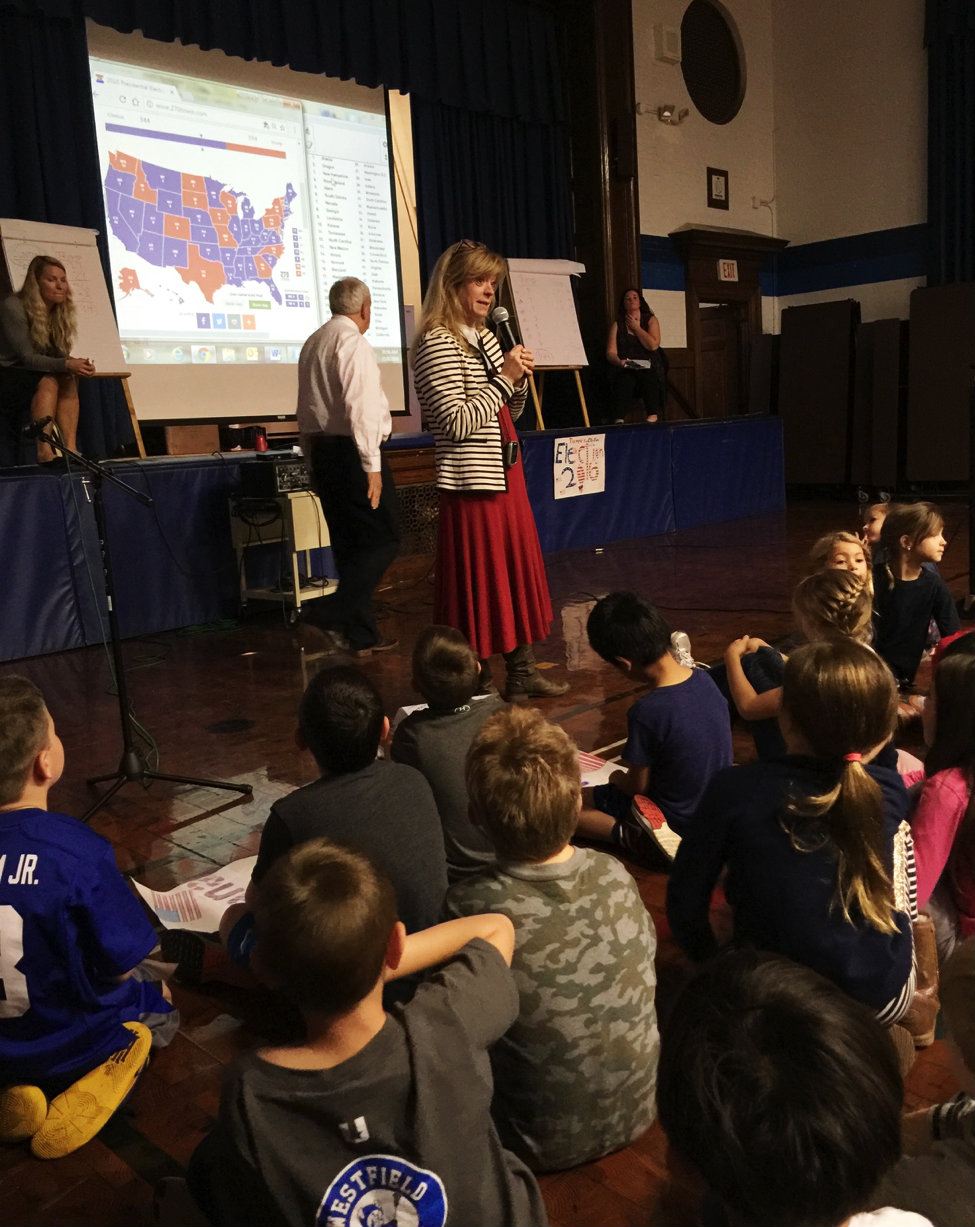
Although my students continue to be surrounded by an air of anger, confusion, resentment, and revolt in the current political climate, they continue to stay positive. They’re kids. We can learn a lot from them.
Pondering war and peace in Pennypacker’s prose
So while I am still experiencing an uncomfortable uncertainty about the future of America and the discomforting responses to Election 2016, there is still the fragrance of hope in our classroom. We are learning that it does no good to focus on the negatives; that letting in some fresh air helps us clear our heads; and that the things that are most important can’t be counted by an Electoral College. Pennypacker’s characters taught us this:
“Peter remembered Vola asking him which side his father was fighting on. Peter had answered her, stunned that she would even have to ask. ‘The right side,’ he’d added, indignantly.”
Vola’s response?… “Boy! Do you think anyone in the history of the world ever set out to fight for the wrong side?” (p. 259)
The air in Classroom 4T is still fresh. We will do our best not to pollute it with negativity and close-mindedness. We will try to be better listeners, to treat each other with respect, compassion, and as much understanding as we can muster.
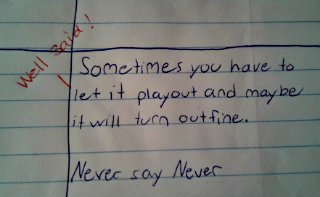
Their fresh outlook gives me hope… and it sure smells better than my son’s camp bag!
Other Resources:
http://www.sarapennypacker.com/paxdiscussionguide.pdf
https://forum.teachingbooks.net/2016/04/guest-blogger-sara-pennypacker/
http://www.npr.org/2016/02/10/466274721/left-to-fend-for-himself-pax-the-fox-must-find-his-human-friend …audio author-interview and reading of the story.

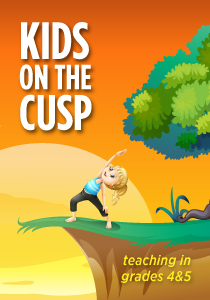
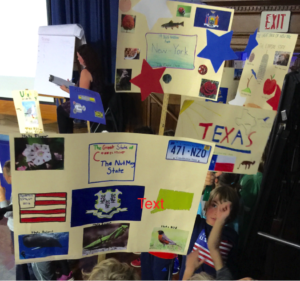 Back to school and the election
Back to school and the election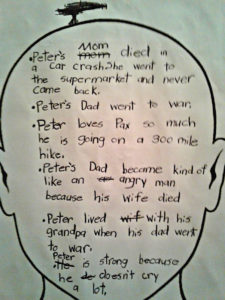
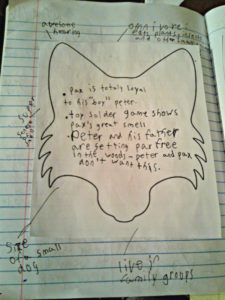


































Never say never